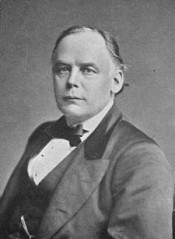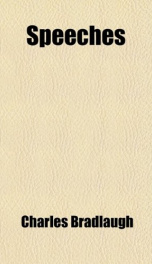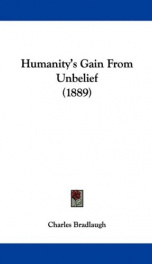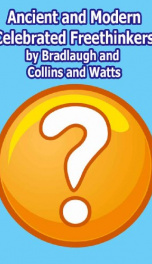Bradlaugh Charles

Charles Bradlaugh (26 September 1833 – 30 January 1891) was a political activist and one of the most famous English atheists of the 19th century. He founded the National Secular Society in 1866.[1] Born in Hoxton (an area in the East End of London), Bradlaugh was the son of a solicitor's clerk. He left school at the age of eleven and then worked as an office errand-boy and later as a clerk to a coal merchant. After a brief spell as a Sunday school teacher, he became disturbed by discrepancies between the Thirty-nine Articles of the Anglican Church and the Bible. When he expressed his concerns, the local vicar, John Graham Packer, accused him of atheism and suspended him from teaching. He was thrown out of the family home and was taken in by Elizabeth Sharples Carlile, the widow of Richard Carlile, who had been imprisoned for printing Thomas Paine's The Age of Reason. Soon Bradlaugh was introduced to George Holyoake, who organized Bradlaugh's first public lecture as an atheist. At the age of 17, he published his first pamphlet, A Few Words on the Christian Creed. However, refusing financial support from fellow freethinkers, he enlisted as a soldier with the Seventh Dragoon Guards hoping to serve in India and make his fortune. Instead he was stationed in Dublin. He resigned from the army in 1853. By this time a convinced freethinker, Bradlaugh returned to London in 1853, and became a pamphleteer and writer about "secularist" ideas under the pseudonym "Iconoclast". He gradually attained prominence in a number of liberal or radical political groups or societies, including the Reform League, Land Law Reformers, and Secularists. He was President of the London Secular Society from 1858. In 1860 he became editor of the secularist newspaper, the National Reformer, and in 1866 co-founded the National Secular Society, in which Annie Besant became his close associate. In 1868, the Reformer was prosecuted by the British Government for blasphemy and sedition. Bradlaugh was eventually acquitted on all charges, but fierce controversy continued both in the courts and in the press. A decade later (1876), Bradlaugh and Besant decided to republish the American Charles Knowlton's pamphlet advocating birth control, The Fruits of Philosophy, or the Private Companion of Young Married People, whose previous British publisher had already been successfully prosecuted for obscenity. The two activists were both tried in 1877, and Charles Darwin refused to give evidence in their defence. They were sentenced to heavy fines and six months' imprisonment, but their conviction was overturned by the Court of Appeal on a legal technicality. Bradlaugh was an advocate of trade unionism, republicanism, and women's suffrage, and he opposed socialism. His anti-socialism was divisive, and many secularists who became socialists left the secularist movement because of its identification with Bradlaugh's liberal individualism. He was a supporter of Irish Home Rule, and backed France during the Franco-Prussian War. He took a strong interest in India. In 1880 Bradlaugh was elected Member of Parliament for Northampton, and claimed the right to affirm (instead of taking the religious Oath of Allegiance), but this was denied. Lord Randolph Churchill roused the Conservatives by leading resistance to Bradlaugh. Bradlaugh subsequently offered to take the oath "as a matter of form". This offer, too, was rejected by the House. Because a Member must take the oath before being allowed to take their seat, he effectively forfeited his seat in Parliament. He attempted to take his seat regardless and was arrested and briefly imprisoned in the Clock Tower of the Houses of Parliament. His seat fell vacant and a by-election was declared. Bradlaugh was re-elected by Northampton four times in succession as the dispute continued. Supporting Bradlaugh were William Gladstone, T.P. O'Connor and George Bernard Shaw as well as hundreds of thousands of people who signed a public petition. Opposing his right to sit were the Conservative Party, the Archbishop of Canterbury, and other leading figures in the Church of England and Roman Catholic Church. On at least one occasion, Bradlaugh was escorted from the House by police officers. In 1883 he took his seat and voted three times before being fined £1,500 for voting illegally. A bill allowing him to affirm was defeated in Parliament. In 1886 Bradlaugh was finally allowed to take the oath, and did so at the risk of prosecution under the Parliamentary Oaths Act. Two years later, in 1888, he secured passage of a new Oaths Act, which enshrined into law the right of affirmation for members of both Houses, as well as extending and clarifying the law as it related to witnesses in civil and criminal trials (the Evidence Amendment Acts of 1869 and 1870 had proved unsatisfactory, though they had given relief to many who would otherwise have been disadvantaged). Bradlaugh's funeral was attended by 3,000 mourners, including Mohandas Gandhi. He is buried in Brookwood Cemetery. [2] A statue to Bradlaugh is located on a traffic island at Abington Square, Northampton. Remembered annually on his birthday, for the rest of the year the statue points west towards the centre of Northampton, the accusing finger periodically missing. Various local landmarks are named after Bradlaugh, including Bradlaugh Fields [3] nature reserves, The Charles Bradlaugh pub, and Charles Bradlaugh Hall at the University of Northampton.
do you like this author?
What readers are saying
What do you think? Write your own comment on this book!
write a commentWhat readers are saying
What do you think? Write your own comment on this author!
write a commentBook list

Some Objections To SocialismFrom "The Atheistic Platform",Twelve Lectures
Series:
Unknown
Year:
Unknown
Raiting:
4/5
Show more
add to favoritesadd In favorites

A Few Words About the DevilAnd Other Biographical Sketches and Essays
Series:
Unknown
Year:
Unknown
Raiting:
3/5
Show more
add to favoritesadd In favorites
Book list

Some Objections To SocialismFrom "The Atheistic Platform",Twelve Lectures
Series:
Unknown
Year:
Unknown
Raiting:
4/5
Show more
add to favoritesadd In favorites

A Few Words About the DevilAnd Other Biographical Sketches and Essays
Series:
Unknown
Year:
Unknown
Raiting:
3/5
Show more
add to favoritesadd In favorites

Heresy: Its Utility And MoralityA Plea And A Justification
Series:
Unknown
Year:
Unknown
Raiting:
3/5
Show more
add to favoritesadd In favorites

Humanity's Gain from UnbeliefReprinted from the "North American Review" of March,1889
Series:
Unknown
Year:
Unknown
Raiting:
3.5/5
Show more
add to favoritesadd In favorites

Ancient and Modern Celebrated Freethinkers
Reprinted From an English Work,Entitled "Half-Hours With The Freethinkers."
Series:
Unknown
Year:
Unknown
Raiting:
4.5/5
Show more
add to favoritesadd In favorites

the autobiography of c bradlaugh a page of his life written in 1873 for the
Series:
Unknown
Year:
Unknown
Raiting:
2.5/5
Show more
add to favoritesadd In favorites

speeches
Series:
Unknown
Year:
Unknown
Raiting:
4/5
Purchase of this book includes free trial access to www.million-books.com where you can read more than a million books for free. This is an OCR edition with typos. Excerpt from book: MARKET RIGHTS AND TOLLS. House of Commons, 22nd April, 1887. Mr. Bradlaugh moved : "That a humble address be presented to her Majesty, praying her Majesty to appoint a Royal Commission to inquire as to the extent to which market rights, and rights affecting places where markets are held, are in the hands (i) of public bodies, and (2) of private persons or bodies of persons. To inquire generally how such rights are exercised, and particularly what accommodation is given in return for charges levied: in what ratio market tolls stand to the value of goods on which they are levied, and how far the regulation of markets by means of bye-laws or otherwise, market rents, stallages, and tolls, and tolls affecting market towns, are restrictive of trade. To report as to the advisability of compelling the transfer of all such rights to local authorities: of prohibiting the farming of tolls and stallages, of prohibiting the placing of restrictions on the sale of goods in a market that may be lawfully sold elsewhere, of providingby means of the incomes from markets or otherwisefor the extinction of the capital account chargeable to such markets, and for declaring all markets to be free and open." In proposing this motion, Mr. Bradlaugh said: I trust that the Government will be able to accept the motion, which in no sense raises a party question. The real object of the motion is to decrease the cost of food to the poorto increase the facilities of the poor for obtaining good food at moderate pricesto encourage the augmentation, by increased cultivation, stimulated by early sale, of home food produce. Atthe present time market rights and tolls in many places have the contrary effect. Whatever may be the result of this motion, and whatever action the Government may feel compelled...
Show more
add to favoritesadd In favorites

labor and law
Series:
Unknown
Year:
Unknown
Raiting:
3.5/5
This volume is produced from digital images created through the University of Michigan University Library's large-scale digitization efforts. The Library seeks to preserve the intellectual content of items in a manner that facilitates and promotes a variety of uses. The digital reformatting process results in an electronic version of the original text that can be both accessed online and used to create new print copies. The Library also understands and values the usefulness of print and makes reprints available to the public whenever possible. This book and hundreds of thousands of others can be found in the HathiTrust, an archive of the digitized collections of many great research libraries. For access to the University of Michigan Library's digital collections, please see http://www.lib.umich.edu and for information about the HathiTrust, please visit http://www.hathitrust.org --This text refers to an out of print or unavailable edition of this title.
Show more
add to favoritesadd In favorites

Humanity's Gain from Unbelief
Series:
Unknown
Year:
Unknown
Raiting:
4/5
HUMANITYS GAIN FROM UNBELIEF and Other Selections from the Works of CHARLES BRADLAUGH WITH PREFATORY NOTE BY HIS DAUGHTER HYPATIA BRADLAUGH BONNER -- INTRODUCTORY NOTE -- THROWN on his own resources as a boy, with every mans hand against him, my father was both essentially and by f rceof circumstances a man of action, and his writings were usually inspired by the need of the time. His pen and his tongue were servants to be used to further the causes he had at heart weapons with which he sought to overcome the dragons of intolerance and superstition. Most of his writings appeared in his weekly journal, the National Reformer, or were issued in pamphlet form. There are, unfortunately, few books to his credit for these demanded more time than he was able to give. The essay, Humanitys Gain from Unbelief, which gives the title to the present selection, was prepared at the request of Allen Thorndike Rice for the North American Review of March, 1889. Although written less than two years before his death and when disease had already begun to sap his fine physique, the paper shows no sign of failing vigour in style or argument. In the openingsentences, commenting on the continuous modification in the dogma and practice of religion, he used the phrase, None sees a religion die, which has been quoted again and again down to quite recent times. While acknowledging the good done by individual Christians, he contended that the special services rendered to human progress by these exceptional men were not in consequence of their adhesion to Christianity, but in spite of it, and in direct opposition to Biblical enactments. This essay was immediately reprinted in various parts of America and Australia as well as here in England, and at once gave rise to a storm of controversy. Sermons were preached in refutation, and discussions took place in the provincial press. The Newcastle Weekly Chronicle, in particular, opened its columns to a lengthy discussion of the subject and, as a consequence, in the following June Mr. Bradlaugh received an invitation from the Rev. Marsden Gibson, a Newcastle vicar, to substantiate in debate the statements he had made. This debate took place in September, and caused much excitement in and around Newcastle. People came from long distances to hear it, and the hall proved too small to accommodate the crowds who desired to attend, so that large numbers were turned away on each of the two nights. Years afterwards some pitmen in a Durham mining village, talking to me of that occasion, recalled with pride and delight how they had clubbed together to hire a break to take them to Newcastle and back, and how they never went to bed that night but stayed up going over the points raised in the debate until the hour of their morning shift came round. Such was the enthusiasm of yester-year. The word Atheist has always been used as a term of obloquy by Christians, even by educated Christians who have not the excuse of ignorance. Misapprehension and deliberate misrepresentation of Atheism have been constant, and indeed are not unknown at the present day. In the late seventies of last century my father wrote A Plea for Atheism, a brief but careful examination of what Atheism really is and what it is not. He wrote this, he said, in the hope of removing some of the msny prejudices against Atheists... --This text refers to the Paperback edition.
Show more
add to favoritesadd In favorites

Ancient and Modern Celebrated Freethinkers
Series:
Unknown
Year:
Unknown
Raiting:
3/5
From Table of Contnts: THOMAS HOBBES. LORD BOLINGBROKE. CONDORCET. SPINOZA. ANTHONY COLLINS. DES CARTES. M. DE VOLTAIRE. JOHN TOLAND. COMPTE DE VOLNEY. CHARLES BLOUNT. PERCY BYSSHE SHELLEY. CLAUD ARIAN HELVETIUS. FRANCES W. D'ARUSMONT. EPICURUS ZENO, THE STOIC MATTHEW TINDAL. DAVID HUME DR. THOMAS BURNET THOMAS PAINE. BAPTISTE DE MIRABAUD BARON D'HOLBACH. ROBERT TAYLOR. JOSEPH BARKER. In these pages, appearing under the title of "Half-Hours with the Freethinkers," are collected in a readable form an abstract of the lives and doctrines of some of those who have stood foremost in the ranks of Free-thought in all countries and in all ages; and we trust that our efforts to place in the hands of the poorest of our party a knowledge of works and workers-some of which and whom would otherwise be out of their reach-will be received by all in a favorable light. We shall, in the course of our publication, have to deal with many writers whose opinions widely differ from our own, and it shall be our care to deal with them justly and in all cases to allow them to utter in their own words their essential thinkings. We lay no claim to originality in the mode of treatment-we will endeavor to cull the choicest flowers from the garden, and if others can make a brighter or better bouquet, we shall be glad to have their assistance. We have only one object in view, and that is, the presenting of free and manly thoughts to our readers, hoping to induce like thinking in them, and trust-ing that noble work may follow noble thoughts. The Freethinkers we intend treating of have also been Free Workers, endeavoring to raise men's minds from superstition and bigotry, and place before them a knowledge of the real. We have been the more inclined to issue the "Half-Hours with the Freethinkers" in consequence, not only of the difficulty which many have in obtaining the works of the Old Freethinkers, but also as an effective answer to some remarks which have lately appeared in certain religious publications, implying a dearth of thought and thinkers beyond the pale of the Church. We wish all men to know that great minds and good men have sought truth apart from faith for many ages, and that it is because few were prepared to receive them, and many united to crush them, their works are so difficult of access to the general mass at the present day." -
Show more
add to favoritesadd In favorites
What readers are saying
What do you think? Write your own comment on this author!
write a commentGenre
- Nonfiction / Philosophy
- Literature & Fiction / Classics
- Books / Free thought
- Books / Antislavery movements
- Religion & Spirituality / Christianity / Reference / New Testament
- Nonfiction / Education / Education Theory / History
- Books / Europe / History / 1848-1849
- Law / Administrative Law
- Books / Anglican Communion / Doctrines
- Books / Negerslaveri / Fr̲enta staterna
if you like Bradlaugh Charles try:
readers also enjoyed
What readers are saying
What do you think? Write your own comment on this author!
write a commentGenre
- Nonfiction / Philosophy
- Literature & Fiction / Classics
- Books / Free thought
- Books / Antislavery movements
- Religion & Spirituality / Christianity / Reference / New Testament
- Nonfiction / Education / Education Theory / History
- Books / Europe / History / 1848-1849
- Law / Administrative Law
- Books / Anglican Communion / Doctrines
- Books / Negerslaveri / Fr̲enta staterna
if you like Bradlaugh Charles try:
readers also enjoyed
Do you want to exchange books? It’s EASY!
Get registered and find other users who want to give their favourite books to good hands!

